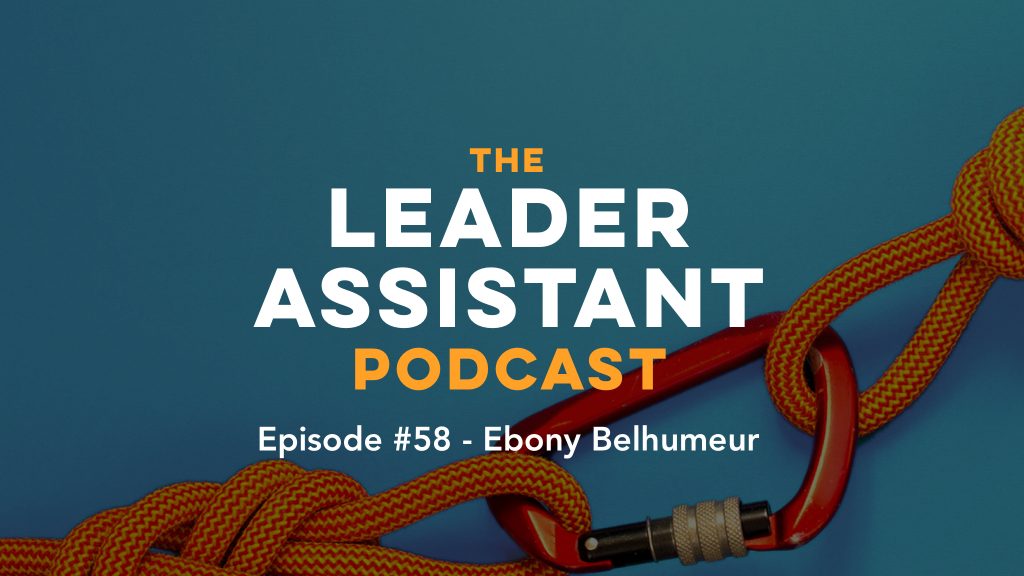Ebony Belhumeur works as EA to the CEO of a company in California, but lives in France. She has 3 young kids and some great advice on working remotely.
Ebony also talks about getting the respect you deserve, anticipating your executive’s needs, managing an email inbox, and more. She’s also founder of The Assistant’s List so check out her resources for assistants.
LEADERSHIP QUOTE
If you’re not lighting any candles, don’t complain about being in the dark.
– Unknown
CONNECT WITH LIBBY
- Ebony’s LinkedIn
- The Assistant’s List blog
- The Assistant’s List on Instagram
- The Assistant’s List on Twitter
- The Assistant’s List on LinkedIn
ABOUT EBONY
Ebony Belhumeur has been an Executive Assistant in San Francisco and Los Angeles for over 10 years.
She is the former Executive Assistant to the CEO of Sephora, the globally loved cosmetic brand. More recently Ebony has focused on supporting Founder & CEOs in the tech space, including at Twitch (an Amazon company).
Currently Ebony is working on the cutting edge of cryptocurrency with the Founder & CEO or Protocol Labs (inventor of IPFS & Filecoin).
She launched her blog, The Assistant’s List in 2020, where she writes about creating a sustainable role for assistants in the New Era.
SUBSCRIBE
Subscribe to The Leader Assistant Podcast so you don’t miss new episodes!
You can find the show on Apple Podcasts, Spotify, Google Podcasts, Pandora, and Stitcher.
Join my email list here if you want to get an email when a new episode goes live.
JOIN THE COMMUNITY
Join the Leader Assistant Slack Community here, or the Facebook Group here for bonus content and to network with other assistants who are committed to becoming leaders!
LEAVE A REVIEW
If you’re enjoying the podcast, please take 2 minutes to rate and review the show on Apple Podcasts here. Each review helps me stay motivated to keep the show going!
—
EPISODE TRANSCRIPT
Ebony Belhumeur 0:00
Hi, I’m Ebony Belhumeur and today’s leadership quote comes from an unknown source. If you’re not lighting any candles, don’t complain about being in the dark.
Speaker 2 0:11
The Leader Assistant Podcast exists to encourage and challenge assistants to become confident, Game Changing leader assistant. You’re listening episode 58 Thank you for listening to The Leader Assistant Podcast. Here’s your host, my dad.
Jeremy Burrows 0:30
Hey friends, welcome to episode 58. I’m excited to be speaking with Ebony Belhumeur today about remote work managing your inbox, and a few other awesome topics. First, I wanted to share that we have a few new online courses at assistantsguide.com. We’re actually launching one with Ebony as well on remote work. But we have one on crafting the perfect resume, managing conflict, travel management, we have one on Linked In mastery from my good friend Maggie Jacobs. And then we have one on managing constant interruptions, as well as another video course to go along with my book called The leader assistant. So check it out at assistantsguide.com. And be sure to check out all the different topics in courses and sign up for some professional development. And don’t forget to have your employer pay for your professional development. If you have any questions about any of the courses, feel free to email me at hello@leaderassistant.com I’d be happy to help again assistantsguide.com for some awesome courses for assistants from some amazing instructors. Alright, today’s episode shownotes can be found at leaderassistant.com/58. And I hope everyone is staying safe and well and enjoys the show. Hey everyone. Thanks for tuning into The Leader Assistant Podcast. It’s your host Jeremy and today I’m speaking with Ebony Belhumeur. Ebony is the executive assistant to the founder and CEO of protocol labs. Ebony how’s it going?
Ebony Belhumeur 2:16
Good. How are you Jeremy? It’s so nice to be here.
Jeremy Burrows 2:19
Yeah. Thanks for being on the show. And what part of the world are you in?
Ebony Belhumeur 2:23
So I actually live in a small town just outside of Paris called tour France. And I work between here where I live and Palo Alto where my CEO lives so I travel about once a month sans Coronavirus. I’m not traveling as much now.
Jeremy Burrows 2:42
Awesome. So that’s a that’s a pretty long commute, right?
Ebony Belhumeur 2:47
Yeah. But I mean, normally, I’m just commuting between my bed in my office, which is pretty nice. That’s awesome.
Jeremy Burrows 2:54
How did you? How did you end up with that gig.
Ebony Belhumeur 2:57
So after my husband and I left San Francisco, we both really were committed to working remotely and decided that we were only going to pursue organizations and companies that had remote positions. My husband being a software engineer, that was pretty easy for him but a little bit more challenging for me being an executive assistant. So I really looked into organizations that I thought had were really mission driven and progressive in the way they thought about how work could be done and what the future of work look like. And there were a couple of companies that I zoned in on and protocol Labs was one of them, I was really passionate about our mission to improve not only the long term integrity of the internet, but the equitability of it as well. And I was also really interested in working kind of at the vanguard of blockchain and crypto technology. So checked a lot of boxes. So randomly, they had an opening for a position for their executive assistant for their CEO, Juan. And I applied, they said no. And I responded saying, I think you should really look at me again, I would really love the opportunity to connect and just tell you a little bit more about what I think I can bring to the organization and they said, Okay, we’ll talk to you. And a couple months later, they offered me the role, and I’ve been there ever since.
Jeremy Burrows 4:23
Awesome. So was it listed as a remote gig or did you kind of convince them?
Ebony Belhumeur 4:28
No, it was listed as a remote opportunity because the entire organization is actually remote. So we have people in Australia and New Zealand, Krakow, Lisbon, myself and France and a couple others New York, Texas and quite a few people in Silicon Valley.
Jeremy Burrows 4:46
That’s great. So what is the kind of number one tip you have for people who are working remote or aspire to work remote someday?
Ebony Belhumeur 4:57
Yeah, so the catch 22 working remote is kind of like the chicken and the egg sort of like if you want to get a remote job, they want to see that you’ve had remote experience of just like getting your first job. It’s like, hey, we want to see you’ve had experience, and you’re like, I’m trying to get my first job. So what I would do, if you’re interested in working remotely, is to look at companies who are remote for first organizations rather than like a couple people work. They allow a couple of senior people to work remotely looking into those organizations, you know, hone in on a couple that, like you feel are really aligned with your mission, and things that you would be passionate about doing and connect with those people, people in that organization before you ever think about applying for that position. So find them on LinkedIn and Twitter, or on GitHub, find out you know, the kind of work they’re doing, comment, get in their comment section, so they have some visibility into who you are and what you do. And in your current role, find out if there are any opportunities for you to work remotely. I guess, fortuitously, we’re in a really great, you know, a bad place, but good place now, for people who want to gain experience working remotely and understand like sort of, what does it mean to prioritize your own workload and connect with people that you work with effectively, when you never, or rarely interact in person. And this is actually a really good opportunity to kind of explore those things, and figure out like, hey, does this work for me? Or am I really uncomfortable, and I’m a people person who needs to be around other people, and get that in person, immediate feedback, or, Hey, I’m really thriving here. I feel like my productivity is up, because I’m not being interrupted constantly with people wanting to share information or talk. So that I think that’s a really good place to start.
Jeremy Burrows 6:52
That’s great. Yeah, I love working from home. I’m more of an introvert. I love kind of getting my stuff done without anybody bugging me. So I get a little bit of flexibility in that you get to work from home occasionally at my current role. But
Ebony Belhumeur 7:11
yeah, that’s awesome.
Jeremy Burrows 7:12
Well, I’m definitely leaning more towards remote.
Ebony Belhumeur 7:18
Yes, absolutely. Like we we have three kids. I have a six year old, a four year old and a one year old. And the commute was not sustainable for my husband or myself in the way that we want to prioritize our family time and the time that we spend engaging in work. So we definitely knew like commuting was over for us, like we were completely done with that. And going forward, we would only be interested in working with organizations that were remote, it just, it’s super hard, you know, to like, be frustrated on the way to work and then come home and like have to spend time with your kids. It’s really nice when you have that flexibility. Plus, we love to travel, hence we moved outside of Paris. So we can, you know, on the weekends, we go to Chateau you know, we go on long weekends, we go to Switzerland, or, you know, Portugal or Spain, which is great, too. So
Jeremy Burrows 8:10
nice. So how do you balance having young kids in the house and working from home.
Ebony Belhumeur 8:17
Um, so I have an awesome partner, I have a great nanny, and our two older kids are in just in the local private school here. So it works out really, really well, because I work for 45 minutes. And then I go upstairs to spend 15 minutes with my youngest daughter, which was really great when I was breastfeeding, because with my oldest two, I was going into the office and I had to pump and it was super stressful for all you working moms out there who knows what that’s like. And, you know, with my youngest daughter, because I was working from home, it’s great. It’s like I just go upstairs, I can nurse her come back down and get some work done. So it’s really, it’s really all been all about balance, but really great. It’s great.
Jeremy Burrows 9:00
So let’s rewind a little bit and tell us about your very first job. And then kind of what you learned in that role that you still use today.
Ebony Belhumeur 9:09
Sure, yeah. So my first role was as a waitress, I was illegally like working under the table when I was 13. Because I grew up incredibly poor in Los Angeles, and my parents needed us to get jobs. So it was a really hard job. But I was like, really inspired by all of the tips that I got. I was one of my favorite parts about working. I think the thing that I always took away from being a waitress is that everyone is the hero of their own story. So when you’re a waitress, you realize how each and every table thinks that like they’re your only table like they have absolutely no conception that like you’re juggling eight or nine different tables with you know, 15 to 20 different customers across those tables, all with their own set of unique demands and work. class. And each table thinks that like, you know, they’re the table that needs to be focused on. And that’s really helped me sort of understand how to develop stronger interpersonal communication skills that reflect the kind of empathy and compassion, compassion you need in order to be effectively collaborative with people, when you understand that when you start thinking about how the other person is approaching this as sort of the hero of their own autobiography, it gives you a really good picture into how and why they’re making decisions.
Jeremy Burrows 10:34
So you’re saying that you’re working with multiple executives right now? It’s like working with multiple tables at a restaurant? Yes,
Ebony Belhumeur 10:41
exactly. Working with multiple customers who all alike are pretty sure that like this is the most important thing you should be doing is getting there salt or extra mayo,
Jeremy Burrows 10:51
definitely teaches you how to prioritize.
Ebony Belhumeur 10:53
Yeah, absolutely.
Jeremy Burrows 10:55
Awesome. So when and why did you become an assistant,
Ebony Belhumeur 11:00
I fell into this role. I think like a lot of people, I started working with a young entrepreneur, who was interested in building a nonprofit that focused on helping at risk youth by collaborating with professional athletes to host like camps, clinics and tournaments. And he was really looking for somebody who had a ton of can do attitude and was clever. I was working at Pepperdine at the time, and he was a graduate student. So he really liked the way I worked as you know, an administrative assistant there and asked if I would, you know, help him start and run this organization, which I thought was super interesting. So I was like, Yes. And I just fell in love with the role and stayed.
Jeremy Burrows 11:41
Awesome. So what do you what do you love about what’s like, the biggest thing you love about it?
Ebony Belhumeur 11:46
Well, I really love the opportunity for constant growth, I really enjoy problem solving and project management. And I think, if you approach your work from a growth orientation, then this role provides endless opportunities to learn and develop. I do a wide breadth of work in any given month, or quarter. And it’s incredibly rewarding to look back and see where I’ve been able to grow and how much I’ve been able to get done and stretch myself every year. It’s just been really amazing.
Jeremy Burrows 12:16
Awesome. What about your number one struggle as an assistant,
Ebony Belhumeur 12:23
I would say that my number one struggle as an assistant has been, I think, imparting the importance and impact of this role on executives, I think executives are apprehensive at first to let anyone in as a partner, especially someone with a title of assistant. And it does take quite a bit longer, I think, to build trust, and help them understand and see the impact of your work. So I think that’s probably been my biggest struggle for sure.
Jeremy Burrows 12:59
Yeah, definitely. Definitely. common to most to a lot of assistants. Yeah. So what would you tell someone to who is kind of not respected? And you know, maybe somebody, maybe an assistant calls you tomorrow and says, Hey, I’m not respected in my role? Can you help me? What would you say?
Ebony Belhumeur 13:24
Yeah, we think there are really two scenarios that happen around that kind of sentiment. So the first is where there’s like an ideological bend or disposition from a company or an executive, where assistance are not respected. So they are the kind of people who make holistic judgments based on sort of one aspect or title in your life. And I don’t know that you can change those minds. And even if you could, I don’t know that the emotional cost that you would have to pay in order to change those minds would be worth it. And I, it can be difficult to tell. But I think that those people are typically more rigid when when you confront them about, you know, having more work added to your plate and how you could, you know, contribute more and have more of an impact in their assessment that like, No, you know, you’re really boxed in and you are going to be defined by this role. The second scenario is when you have people who do not really showing you respect, because you haven’t yet earned their respect. So maybe you’re performing at expectation of a stereotypical assistant, right? So you grab coffee, it’s always there on time you order snacks, you arrange their calendar, and it looks great, but it’s really difficult for those people in your org or your leader to point to places where you’re explicitly adding value and making impact. And those people aren’t convinced double and can you know Learn to respect and understand your role in a much deeper and more nuanced way. And I would encourage those people in the second scenario to work on earning respect, right. So that means taking on projects and volunteering for projects that like most other people don’t want to do, documenting your learnings, and then being able to point back to where you’ve added value and impact. sitting in meetings, going above and beyond and saying, Hey, I would love to, you know, sit in on this meeting, you know, in a note taking capacity. And if you don’t need me and a note taking capacity than simply as an observer, to sort of help understand where your priorities lay, where crossover work is happening, and know, you know, the values and importance of the stakeholders involved in these different work streams. In the first scenario, where it’s an ideological bend, I encourage those assistants to continue smiling politely, but to quietly brush up their resumes, and reach out to their network and open themselves up for opportunities actively on LinkedIn, in a way that like, you know, obviously respects your privacy and can be done in a very low profile. But I think it’s really important to remove yourselves from those positions. I think study after study shows that people who don’t feel psychologically safe for reasons like I’m not being respected in my workplace, are going to eventually leave their roles. But more importantly, it’s likely that, you know, assistance in those companies are also being rotated out, like in a revolving door. So proactively finding a new place for yourself, where you’re respected and getting clear on that in the interview process is probably my best piece of advice.
Jeremy Burrows 16:54
Love it. So let’s talk about one way you can level up if you will, how can assistants anticipate their executives needs,
Ebony Belhumeur 17:03
I always give the advice of going on safari, I sounds kind of weird, but I what happens, the work that we do is not magic. And as much as I love black girl magic and black admin magic, I generally discourage the narrative that we’re magicians or mind reader’s because the work that we do is incredibly strategic and enormous ly impactful. And although it’s tough to measure, we need to be more intentional, intentional about quantifying the impact that we make through things like anticipating our executives needs. And the advice I as I mentioned, I always give is to go on safari. And what I mean by that is to strategically find relevant stakeholders to reach out to and find information that matters, right. So I always tell people, like I don’t know what my boss does, because he tells me what he does. I know because I’m constantly on safari, I’m constantly reaching out in forums and channels on slack to find out where his priorities lie, what commitments he’s made in a recent meeting that maybe I didn’t attend, I’m reaching out to event organizers via email and on Twitter to understand what their priorities are for this year, whether or not they would like to engage with my executive on the work that he’s doing in these specific channels. And also, just like constantly staying in touch with our leadership team, so my boss doesn’t necessarily have time to constantly be checking in with the leadership team to make sure that, you know, we’re on track, they feel positive. So I’m doing that work on my own, rather than waiting for my boss to say, like, oh, I spoke with Steve about this last week, but I forgot to tell you, and now it’s due. So the second he meets with a one on one with his executive right after that’s done, you know, I’m in there with that executive meeting and saying, you know, hey, what commitments did we make in this meeting? What priorities came out of this? Is there new alignment? When do we think this is going to impact the timeline that we’ve set for you know, other work items and and then when I meet with my executive and our one on one, I’m able to bring all of this information that I’ve gone around the or collecting to him to sort and prioritize and create plan texts around.
Jeremy Burrows 19:36
That’s great. Awesome. I definitely, it’s definitely interesting. So how you mentioned okay, you know, you maybe you go in after the meeting and find out what the, what the action items are. Do you do most of that I’m assuming through slack or through instant message or do you kind of hop on calls with these executives since you’re not there in person most of the time
Ebony Belhumeur 20:00
Yeah, so I will do either like hop on a call quickly or follow up on Slack either way, depending on what their availability is. And what makes sense for me at a time. Usually, if I’m, you know, going to pick up my kids, I’m probably going to do it on Slack. And honestly, you can probably just program a little like bot on slack to, you know, say, like pinging you to add your follow ups here. So what I’ve created is like a system over the last year that helps people understand that the way to actually get work done super productively, isn’t to, you know, make a ton of commitments in a meeting. But to have a follow up with Ebony that details the work that was committed to so I think of myself, and I talked about this with our other admins in our organizations is logistical leadership. So we work with strategic leaders, our executives are the people who set directions, they are the dreamers who can put a vision in front of a team and rally us around a goal that might seem like incredibly far off. And the way that we get to those goals that our leaders are able to set is through people like ourselves, who prioritize the really, what what might seem to be menial and mundane tasks that require us to take the steps every day, we need to in order to achieve those goals. And logistical leaders are equally if not more important, as strategic leaders are. And when you take on sort of the mantra of oh, I’m a logistical leader, that means I do the work that a leader does, I hope, you know, call these action items I help you know, I act proactively is a point of accountability in my organization within my project team or working, or company to ensure that all of the logistics are effectively managed, that are going to help us get to where we need to be on the end.
Jeremy Burrows 22:04
Yeah, I love that. We’re just cool leadership. That’s awesome. You should write a book about it.
Ebony Belhumeur 22:10
I’m writing a book. But yeah, it’s not about that.
Jeremy Burrows 22:14
What’s the book about?
Ebony Belhumeur 22:17
The book is actually about moving into the age of ubiquitous technology, and what it means to be an assistant in the this era, where there are things like TaskRabbit and Siri that are really, I think swallowing a lot of what used to define our core competencies, and understanding how do we define new core competencies? And how do we build the skills in order to level up in this era?
Jeremy Burrows 22:50
Awesome. Love it? Well, you have an ETA on that book?
Ebony Belhumeur 22:55
Yeah. q1 of 2021. Awesome. Awesome.
Jeremy Burrows 23:02
Okay, so if you could snap your fingers, and instantly give all assistance, more of something, what would it be?
Ebony Belhumeur 23:10
I would say executive presence. I think that a lot of assistance, especially executive assistants, don’t take the executive in their title very seriously. And for me, that means that you are an executive, I am an executive at assisting people and leaders. So I think and how I define that is bringing your whole self to work. So that means not bringing very siloed portions of our thinking to work, but really bringing like the entire breadth of our experience to bear on our work. So we have really a really deep well of experiences to truly choose from in order to help problem solve. I also think it’s important to ask valuable questions that deepen our thinking around a problem. And I think executive assistant are really in an excellent position to be able to do that. I writing a small talk on effectively managing up that talks about the art of humble inquiry, and how you can really use that to make a huge impact in meetings and, you know, collaborative environments with other leaders. And then finally, I always say like, encourage others, because leaders and executives are the people who applaud others for doing great work. And this means, you know, understanding deeply how their work is making an impact. So it implies a level of strategic thinking, right? Because we don’t just applaud any and everything. You know, we aren’t raising babies here, but it when we know how people’s work makes a strategic impact on our goals, or OKRs. We’re able to applaud them accordingly, which is something that you see really good executives doing very well like understanding that recognition is a renewable resource and leveraging it accordingly.
Jeremy Burrows 25:08
That’s great. I love what you said about executive kind of putting the executive back in the executive assistant.
Ebony Belhumeur 25:16
Yes, absolutely. We have to do that. Yeah.
Jeremy Burrows 25:20
Love it. So what’s one book or resource that you would recommend to assistants?
Ebony Belhumeur 25:27
There are so many because I always say our minds are like computers, we can only do what we can with the information that’s, we have. So whatever we input into ourselves, we’re able to kind of make solutions and problem solve around. So I’ll give you a couple. The One Minute Manager, I absolutely love this book. It is critical, in my opinion, for assistants to read, because I believe that we’re people, managers, for our executives. So we are the we have to learn how to manage. And I think that skill is really underrated for assistants. So please read the One Minute Manager. So good, they can’t ignore you. I think this is a really great book about the importance of leveling up through craftsmanship and finding out how you can add value versus waiting for something you’re, you know, super passionate about to come along. And then finally how to have impossible conversations. Because I think the best assistants are the people who are able to diplomatically and tactfully engage with leaders on really tough subjects like, hey, we keep missing our deadlines. How do we make progress on this? So learning, the art of being able to tactfully engage with people who have ostensibly have no boss, is a really important skill to develop. So that would be the third one, I would say.
Jeremy Burrows 26:49
Awesome. I have the so good. You can’t ignore or they can’t ignore you book on my list. I haven’t gotten to gotten to Okay,
Ebony Belhumeur 26:56
all excited. Yeah, really good.
Jeremy Burrows 27:00
What’s your number one tip for managing an executives email inbox.
Ebony Belhumeur 27:09
I always say like go to three folders. I believe in this so deeply when I was supporting the CEO of Sephora. It was like a little bit gnarly. And I had never worked in a company that large before. All of my previous work had been in companies that were probably like 50 employees or less. And then like, I went to this mammoth of a company that was like globally recognized, and I was like, completely overwhelmed. And I read this article, I want to say it was like in Forbes, or The Wall Street Journal that was like, you only need three folders. And I’ve lived by that principle, every ever since. So the follow up folder for anything that like needs to be followed up with in the next, you know, couple of days or weeks, the today folder, which I love, because it’s like, I can check that folder, I can sort quickly and then live in that folder each day. And at the end of the day, I can quickly go in and archive or you know, place where it’s a new appropriate folder. And then the third one is reference, which is just stuff that like somebody linked to a doc that I should probably be able to access. So it’s just kind of like my library where I can go and type in and search for any email that I need in my reference section. And doing that for my executive has been gold for them as well because they know that anything in their to do folder they in their today folder they need to do today. And that helps them work with the kind of competence that I think we should be giving empowering our executives to work with. So they can go quickly into their today folder and know like, okay, Ebony’s got this all organized for me. So anything in here I need to address and the rest can be, you know, appropriately set aside or ignored until it moves into the today folder.
Jeremy Burrows 28:56
Yeah, I think keeping the system whatever system you use, whether it’s a three folder system, or four folders, or labeling or whatever, I think as long as it’s simple. Yeah, don’t use all that energy trying to decide what to do with each email. That’s the that’s the key to managing your inbox. And you’re also your executives inbox.
Ebony Belhumeur 29:20
Yeah, I totally agree. Simplicity is key.
Jeremy Burrows 29:23
Yeah, yeah. So all right. Let’s talk a little bit about the assistants list. So you have a blog, the assistance list.com. Tell us about why you started it and kind of what your dream and mission is for it.
Ebony Belhumeur 29:40
Yeah, so I swore forever that I was going to start a blog and like, I was a debater in college for a competitive team. And I swore I was going to start a blog and I had like a small esoteric blog that was like focused on debaters. So like, I stopped that. And then I had kids and I never got around to doing the blog. So after my daughter turned one, last year, I like committed to myself that I was going to do this and like create a space for all of my ideas that I was like scribbling in journals, and, you know, writing in my little journal every week, and I have like piles of these that like weren’t going anywhere. And they were just kind of sitting in a closet. And I was like, I have to, like, put these into the world and like, have a place for my creativity to live that other people can access. And I was like, You know what, I’m going to do this, I’m going to start this blog, I promised myself so like, over the Christmas break, I just sat down. And I started like writing and writing and like creating these ideas around this blog, and what it was going to be called, and I started the Instagram page, and it was really exciting and super awesome. So it really is like all of the hard earned wisdom and thoughts that I’ve garnered over the last 10 years in my career as an EA working for a wide variety of companies in tech and corporate retail and nonprofit in crypto that I hope to share with other assistants to help them you know, answer a lot of questions that I have gotten over the course of my career. I think kind of like, my long term goal for this is just like a home for my writing, but a place of community for other assistants to come and ask questions and like, help each other I there’s some really great places that have been emerging that I’ve seen, like The Leader Assistant Podcast is such a great place, which is really wonderful. And I’m excited for assistants who are coming up now. Because like they have they have access to so many of these resources, which I think it’s just really awesome. It’s really exciting to see assistants feeling empowered, and like wanting to put our voices out there in places of like authority and leadership. So I’m super excited about that. But yeah, that’s kind of like the hope for the blog is like, I love blogging. So it’s a blog, I mean, it’s a place for like really strategic pieces of information to live in sort of like a wisdom repository for other assistants, who you know, have a ton of questions like I did.
Jeremy Burrows 32:22
That’s great. So what can we do to support support you on your blog?
Ebony Belhumeur 32:30
Um, just, you know, I would say right now, signing up, you know, to my mailing list, and you know, going over checking out some articles, or sharing them on LinkedIn would be great as well. Definitely.
Jeremy Burrows 32:43
Awesome. Well, I’ll definitely share the links in the show notes, so people can find you. And yeah, check it out. My kind of final question for the interviewer is what makes an assistant a leader?
Ebony Belhumeur 32:57
That’s a great question. I always think that like what makes people a leader is their ability to inspire others to action. And when we do that effectively as assistants by like corralling our executives, or our teams, to act in ways that are both, you know, energy efficient and strategic. That’s really what makes us great leaders.
Jeremy Burrows 33:23
Totally agree. Awesome. Well, Evany, thank you so much for taking time out of your day, all the way from France. Really excited to share our conversation with the world. And yeah, just thanks again for doing what you’re doing. And I love the remote work. situation you have set up and being able to eliminate your commute. Just think that the world is spins kind of slow, but I think we’re getting more and more traction towards moving that route, or at least giving that option to a lot of people. So
Ebony Belhumeur 33:57
yeah, absolutely. Thank you so much, Jeremy. It’s been a real pleasure. Awesome. Well, we’ll talk soon. Okay, sounds good.
Jeremy Burrows 34:03
Thanks again to Ebony for a great episode, check out the show notes at leaderassistant.com/58. And don’t forget to check out our online courses at assistantsguide.com.
Unknown Speaker 34:30
On Apple podcast goburrows.com







